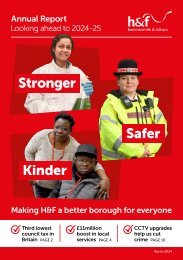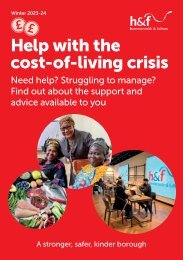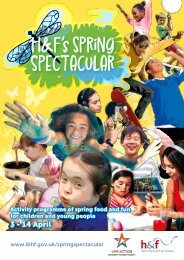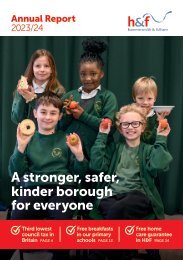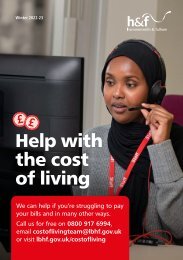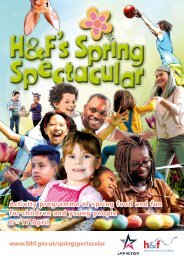H&F Climate Education Guide for Educators
“It is vital that the borough's children and young people are put at the heart of all efforts to deal with the climate and ecological emergency. It is their future that will be affected by decisions that are made today.” Paul Beaty-Pownall Climate and Ecological Emergency Commission Chair
“It is vital that the borough's children and young people are put at the heart of all efforts to deal with the climate and ecological emergency. It is their future that will be affected by decisions that are made today.”
Paul Beaty-Pownall
Climate and Ecological Emergency Commission Chair
Create successful ePaper yourself
Turn your PDF publications into a flip-book with our unique Google optimized e-Paper software.
1
“It is vital that the Borough's
children and young people
are put at the heart of all
efforts to deal with the
climate and ecological
emergency. It is their future
that will be affected by
decisions that are made
today”
Paul Beaty-Pownall
Climate and Ecological Emergency
Commission Chair
Climate Education
Guide for
Educators
2
Table of Contents
Welcome
Dear colleague,
Welcome ............................................................................................ 2
Climate Change in H&F ....................................................................... 3
Getting Started ................................................................................... 3
Introduction to Climate Education ..................................................... 4
Schools approach to Climate Education ............................................. 5
Initial areas to consider ...................................................................... 7
Activities, Resources and Campaigns ................................................. 8
Benefits .............................................................................................. 9
Useful Contacts .................................................................................. 9
Now, more than ever, it is time for
us to unite and work together
to combat climate change. These
are incredibly challenging times,
yet they also present an
opportunity for schools to explore
the recovery of nature and
our environment alongside the
recovery of our communities.
Over the years, the school
community in H&F have participated in many projects designed to
develop their confidence, communication, and related skills. Now is the
time to showcase the incredible talent within your schools and let the
world know that we are ready to change it for the better.
In offering access to climate education within our schools we also offer,
with our key partners, the chance for children & young people to
champion a variety of related initiatives. We invite you on this journey
and know that by empowering children and young people we can help to
address climate change.
I know how passionate you all are about learning and your communities.
Your efforts will galvanise the climate change education agenda in H&F,
the UK and beyond and help to set the standard for new curriculum
developments with our ongoing support along the way.
I am so happy you are joining us and wish you every success as you
embark upon this important venture!
3
Climate Change in H&F
Getting Started
Hammersmith and Fulham declared a climate emergency in July 2019
[i]
.
The key message being that: “Hammersmith & Fulham has already
made a huge effort towards becoming the greenest borough [ii] in
Britain, including a whole range of policies which will:
Phase 1
Brainstorm your own ideas, what are the key issues
in your school? How is climate change impacting
your school community? Discuss with your
colleagues, managers and governors how you would
like to make changes within your school?
• improve air quality
• promote biodiversity
• reduce traffic congestion and pollution
• make our streets cleaner and greener
• work with our community to put environmental concerns at
the heart of all we do.”
Phase 2
Join termly support group sessions. There, you will
be able to receive input from Climate Experts, hear
ideas from other schools in the borough, share
learning and think of creative ways to engage with
your school community and plan your own project.
This message was reiterated in October in a call for a resident-led
Climate and Ecological Emergency Commission [iii] .
The impact of Covid 19 and relational environmental factors has
highlighted how a recovery ethos can be delivered through Climate
Educational programmes. For example, we are in the process of
relaunching the Mudlarks with a specific focus on recovery – the
recovery of nature and the recovery of our school communities.
Phase 3
After carefully planning and discussing you are now
ready to implement your project. You are part of the
Climate Education Group (CEG) . You also have all
the tools necessary to incorporate climate education
into curriculum lessons.
Introduction to Climate
Education
4
This welcome pack provides a general overview with useful links and
resources, along with a menu of activities to help you in meeting
curriculum and staff development within your school.
Headlines
• Join H&F in a pledge to be Carbon neutral by 2030.
• Offer a teacher in each school a training opportunity to
become a Climate Change Champion and complete the
United Nations eduCCate Global course
• Being part of the CEG enables you to mine a wealth of
resources and implement eco projects via our partners in
H&F and this will assist you in developing and enhancing the
curriculum.
• Participate in termly network meetings, receive support and
collaborate with other climate champions worldwide: Two
eduCCate Global accredited teachers, will offer support and
guidance on completing the accreditation and developing
climate change projects.
• Collaborate with Melanie Harwood, Co-founder and CEO of
eduCCate Global, the British Council may support schools
with further funding for Climate Change projects.
• In the summer term of 2021, we will host a Climate Change
conference to celebrate your contribution to the project
with the United Nations and the eduCCate Global
community.
• Access a Network of 40 countries worldwide and thousands
of other schools working collaboratively for a more
sustainable future
Schools Approach to
Climate Education
5
“Education is an essential element of the global response to climate
change. It helps young people understand and address the impact
of global heating, encourages changes in their attitudes and behaviour
and helps them adapt to climate change-related trends,” (UNESCO 1 ).
Its thrust is unequivocal; yet the knowledge, skills and
understanding associated with climate education are diverse.
__________________________________________________________
“Climate change currently appears in numerous elements of the school
curriculum.” A spokesperson from the Department of Education continues: “In
primary science and geography, pupils study topics that provide the underpinning
knowledge and understanding required to study climate science in secondary
school. The primary curriculum also involves looking at changes across the four
seasons, weather patterns, climate zones, vegetation belts, and the water cycle
2 .”_________________________________________________________
The connections between climate education and a range of subject areas
is also acknowledged. Just a cursory look at the primary school national
curriculum shows that aspects of climate change might also be included
in subjects such as Art, DT, and RE. With the focus that we have on reading
in primary schools, along with the development of children’s vocabulary,
it might be suggested that the selection of fiction and non-fiction books in
primary schools be reviewed to include a climate education content.
Climate education can also be developed with the youngest EYFS children,
as they understand the world through outdoor learning, growing, and
developing a respect for living things.
6
Climate education in primary schools needs a subject vehicle that
will encourage children to develop the skills they need to think
about issues around climate change. That vehicle could be PSHE,
and as a primary school programme of study, children will
develop skills in problem solving, critical thinking, creativity,
engagement, resilience and imagination and this can be used to
enable them to understand climate change. Extra-curricular
activities in primary schools, from clubs that develop ecowarriors
to debating groups that enable children to voice their
ideas are included here as potential activities to support climate
education. School activities that enable children to practically
conserve and protect the environment and learn to voice their own
concerns, are an essential part of climate education. Ofsted
requires that leaders “…have built a curriculum with appropriate
coverage, content, structure and sequencing, and that has been
implemented effectively…”
______________________________________________________
“All schools will have to consider what their curriculum is aiming to achieve.
Those who recognise the rising tide may well ask, what’s the aim of our
programme of education in a warming world?” Jonathan Baggaley, Chief
Executive for the PSHE Association.
_______________________________________________________
When these two comments are taken together it enables
an ambition for climate education that is carefully planned, in terms of
curriculum intent, implementation, and impact across the whole
primary school curriculum, including subject based learning, and
extra-curricular activities
1
https://en.unesco.org/themes/education-sustainable-development/cce
2
This D of E quote (2019) and the title of the section appeared in: https://
dfemedia.blog.gov.uk/2019/05/24/how-we-are-educating-the-next-generation-about-thebattle-on-climate-change/
3
This quote comes from a leading PSHE article on climate education: https://medium.com/
@pshecalendar/ what-should-we-tell-the-children-2e482a202941
7
Developing climate education in primary school –
initial areas to consider:
• Subject overviews across the primary curriculum – where
does climate education fit?
• Geography and science – has the school made the links with
climate education explicit?
• Reading – are teachers across the school using resources
that include climate education materials?
• Developing climate education within the primary PSHE
programme – materials, teaching strategies, age groups,
etc?
• How does climate education for EYFS children fit into the
whole school programme?
• Extra-curricular clubs, activities and assemblies – how do
these contribute to the whole climate education programme
8
Activities, resources and campaigns you can get involved with
Teaching and
Learning
Transport and
Environment
Food and Waste
Art and Recycling
Biodiversity and
Green Spaces
Teaching lesson plans and
resources
Sign up to
Let’s Go Zero Campaign
from Ashden
Reducing waste and food in
school - sustainable
procurement
Canal River Trust arts in the
waterways
Hammersmith Community
Gardens Association Offer
Primary school book list –
preliminary list
Creative climate education
resources for schools to use
and weave across a range of
subject areas
Sign up to
Less CO2 Campaign
from Ashden
Urbanwise School Travel
Project
WRWA School Programme
WRWA How to reduce
waste at school
Bow Seat Ocean Awareness
Programme
TES- article on arts projects
and ecology resources
Frugi Challenge and Green
Flag Funding
RSPB: Resources for children
A range of educational
resources and information
for teachers
Sign up and participate in
the Youth Climate Summit
Teachers Climate Guide
Urbanwise Primary Schools
Programme
Eco-Schools Transport Wrap (reducing waste) Wetland Wildlife Trustresources
for arts projects
and ecology
Tree Tools for Schools
9
Benefits
Benefits to schools
• An additional resource in school’s strategic
vision for the Recovery Curriculum
• Links with the curriculum
• Improved inclusion and attainment
• Increased links with the local community
Benefits to children
• Improved study skills
• Increased self-esteem and self confidence
• Improved personal and social skills
• Improved motivation to learn
• Engendering a sense of achievement and autonomy
• Improved level of attainment
Benefits for parents/carers and families
• Pride in their child’s achievement
• Understanding children’s concerns
• More positive links with the school and community
Useful Contacts
School and Communication liaison:
Keith Fernandes
keith.fernandes@lbhf.gov.uk
Curriculum liaison:
Teresa Kiely
teresa.kiely@lbhf.gov.uk
Climate Education special projects liaison:
Diana Edgecombe
diana.edgecombe@lbhf.gov.uk
Michelle Rebelo
michelle.rebelo-hf@lbhf.gov.uk
Outdoor Learning liaison:
Urbanwise.London
moya@urbanwise.london





